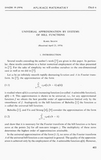Article
Full entry |
 PDF
(3.7 MB)
Feedback
PDF
(3.7 MB)
Feedback
 PDF
(3.7 MB)
Feedback
PDF
(3.7 MB)
Feedback
Summary:
Let $\{\omega_y\}$ be a system of infinitely smooth rapidly decreasing functions and $\eta (h)$ a certain increasing function, $\eta (0)=0$. Then the approximation sought in the form $\sum c_k\omega_{\eta(h)}((x/h-k)\eta(h))$ is universal, i.e., for any approximated function $f$, the system $\{\omega_y\}$ of hill functions gives the best possible order of approximation limited only by the smoothness of $f$.
Moreover, the system $\{\omega_y\}$ can be chosen so that the Fourier transform of $\omega_y$ has zeros at the points $\pm2\pi j/y; j=1,\ldots, J$. As a consequence, the error of the approximation decreases.
References:
[1] I. Babuška: Approximation by hill functions. Comment. Math. Univ. Carolinae 11 (1970), 787-811. MR 0292309
[2] I. Babuška: The rate of convergence for the finite element method. SIAM J. Numer. Anal. 8 (1971), 304-315. DOI 10.1137/0708031 | MR 0287715
[3] I. Babuška J. Segethová K. Segeth: Numerical experiments with the finite element method I. Tech. Note BN-669, Institute for Fluid Dynamics and Applied Mathematics, University of Maryland, August 1970.
[4] G. Fix G. Strang: Fourier analysis of the finite element method in Ritz-Galerkin theory. Studies in Appl. Math. 48 (1969), 265-273. DOI 10.1002/sapm1969483265 | MR 0258297
[5] J. L. Lions E. Magenes: Problèmes aux limites non homogènes et applications. Vol. 1. Dunod, Paris 1968. MR 0247243
[6] J. Nečas: Les méthodes directes en théorie des équations elliptiques. Academia, Prague 1967. MR 0227584
[7] K. Segeth: Universal approximation by hill functions. Czechoslovak Math. J. 22 (1972), 612-640. MR 0310502 | Zbl 0247.41011
[8] K. Segeth: A remark on a class of universal hill functions. Acta Univ. Carolinae-Math. et Phys. 15 (1974), No. 1 - 2, to appear. MR 0390598
[9] G. Strang G. J. Fix: An analysis of the finite element method. Prentice-Hall, Englewood Cliffs, N. J. 1973. MR 0443377
[10] K. Yosida: Functional analysis. Academic Press, New York-London 1965. MR 0180824 | Zbl 0126.11504

